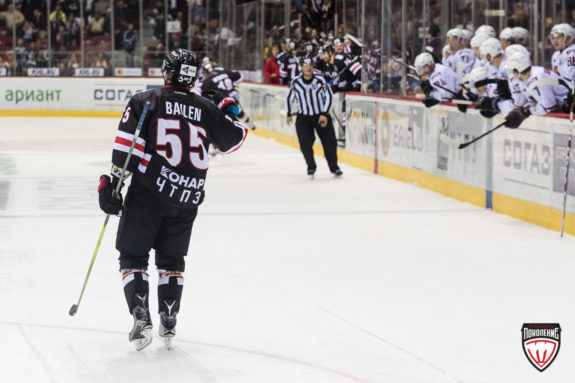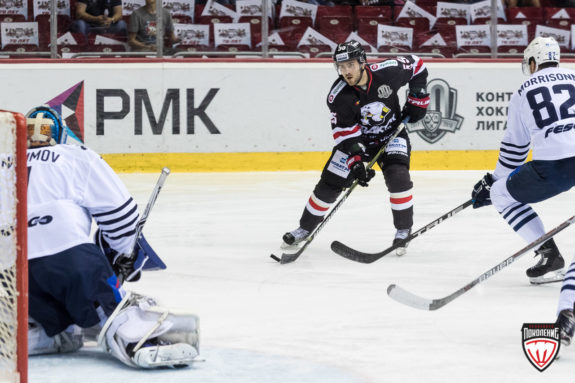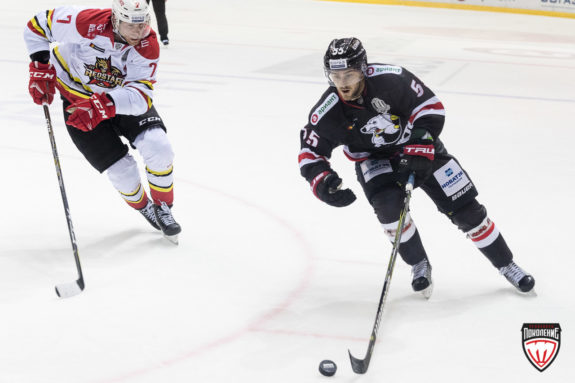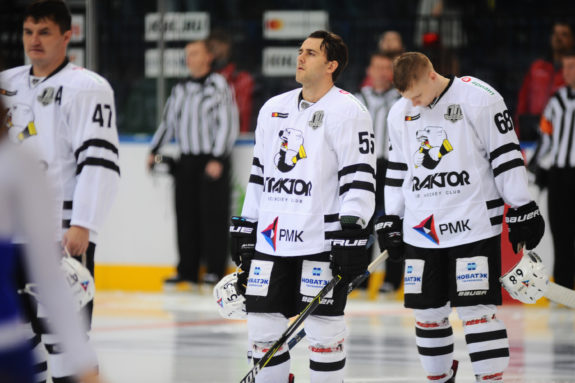RPI alumnus Nick Bailen didn’t have an impact in North America but is having a very good career in Europe instead. In this translated interview, originally appearing on the popular Russian website Sport-Express, American defenseman Nick Bailen discussed his move to Traktor Chelyabinsk, his career and his time in the NCAA, and sheds some light on his private life.
* You can enjoy the original Russian interview by Igor Eronko *

Signing with Traktor Chelyabinsk
Igor Eronko: Not long after signing with Traktor, you agreed to renew your contract for one more year.
Nick Bailen: I had a good preseason, the team played well, that’s probably why they offered me a new contract.
IE: I’ve heard that other teams were interested in you for the future.
NB: I didn’t know. What team?
IE: Avangard Omsk.
NB: Maybe it’s because in Omsk the defensive coach is [Belarusian] Vladimir Kopat, with whom I worked in Minsk. But I don’t really know anything about it. In any case, I can always get traded, no matter my contract, if they want. I can’t control that. But I have considered everything. Chelyabinsk is a good city, the team is great, and one of my best friends is [teammate Paul] Szczechura. I also wanted some stability. We reached a deal fast because I didn’t want to spend the season thinking about finances or similar things.

IE: Did you see any Traktor games from last year? They are a hard-working, very defensive team and you’re more of an offensive defenseman.
NB: As far as I know, and according to what the coach and Szczechura say, we are trying to change the team’s conception to play in a more offensive way. But we are still a hard-working team. We can create a lot of chances. For example, we could have scored five or six goals against Lokomotiv [Yaroslavl] but we scored only one. It was the same against Minsk. [Swedish goalie Jhonas] Enroth saved everything, we couldn’t beat him as he played very well. But it’s not terrible, we just need to get by this unlucky period. I’m sure everything will be okay.
IE: [Traktor’s head coach] Anvar Gatiyatulin doesn’t speak English. How do you communicate with him?
NB: Szczechura warned me about it, but it looks like he’s trying to learn the language. He speaks a little English, I speak a little Russian, so we can talk freely in a mix of the two languages. I know the grammar, sometimes I make some little mistakes or confuse some words, but we understand each other. Then, [assistant coaches Ravil] Gusmanov and [Vitali] Yachmenev speak perfect English, they can translate if needed, so there are no problems with it.
IE: Don’t you plan to study Russian?
NB: I attended language courses in Minsk but during the season it’s very hard to find the time. There are games every other day, and it’s hard to find two or three hours to study. It may sound odd, but in Chelyabinsk, I have learned more Russian words than in two years in Minsk. Probably it’s because in Minsk we had ten foreign players, and here I need to talk more in the Russian language.

I always have Russian guys around me in the locker room. And that’s good. Next to me is our team captain, Alexander Shinin. He decided that he needs to teach me one or two words in Russian every day. And he wants me to repeat them twenty times. This helps me a lot. I really learned a lot in these two months. I understand a lot more, but talking is very difficult. But all the guys try hard to understand me.
Studying and Playing in the NCAA
IE: You played for Bowling Green in the NCAA, but after one year you went back to the USHL. What happened?
NB: Simply the whole coaching staff was fired, the board wasn’t ready to support the team the same way and I wanted out. You know, if you want to change colleges, you have to sit for a whole season. Thankfully, my age allowed me to get back to the USHL, and I re-started playing for Indiana. Then I moved on with RPI.
IE: The RPI is one of the most important colleges in the world in the natural sciences.
NB: Yes, they produce a lot of great engineers, but I studied economics and finance (laughs). That’s because I only spent three years there and I couldn’t take more difficult courses. My finance course was perfect for those three years. I managed to complete it in two years and then I added economy for my third year. I really wanted to get the best out of my time in college.
I like studying. I was studying for free while I played hockey and it would have been stupid not to take advantage of such a great opportunity. I could have studied something easier, but I had to think about my career after hockey, I needed to study and learn how to use my money, how to work with finances and the best way to invest. Generally speaking, I like the world of the finance and I think I am pretty good at it.
IE: What’s your opinion on the Bitcoin?
NB: I don’t believe in it. You see that there are more and more limits to its use. In China, for example. But that’s just the start. You know, the bitcoin is now the same “pseudo-currency” as the Dollar or the Ruble right now; they are pretty much “air”. There is no gold standard anymore. But the Bitcoin is more similar to the financial pyramids. It could happen that one day we won’t be able to exchange Bitcoins anymore, although I can’t say that for sure. Now there are a lot of new technologies, people don’t understand them, and so new things get hyped fast. In the last year, there was a lot of chatter about the Bitcoin and the crypto-currencies in general. It will be interesting to see how the market will react once China completely bans the use of the Bitcoin.
IE: If you weren’t a hockey player, what would you be?
NB: Probably an investor for a bank. This topic is really interesting to me. But from another hand, I wouldn’t like that it would eat up all my time and I would just stare at the computer. So, probably I’d study further to become a sports management specialist. It would be very exciting to be the director of a college team.

IE: You were awarded NCAA All-Star team honors. Usually, these players go on to the NHL. Why didn’t you?
NB: Unfortunately, RIP wasn’t very high in the rankings. In my last year, I was named to the All-American squad. There were 11 players selected, and ten of them play in the NHL. Everyone but me. Maybe I’m too small for the NHL. But you know, everything happens for a reason. In my very last game for RPI I suffered a groin injury. I couldn’t play in the AHL as I missed more than two months. And when I started playing again, it wasn’t the best decision. I wasn’t ready, I wasn’t in shape, and I suffered another injury and played at about 70% of my potential. It’s too bad that I couldn’t take advantage of my chance. If I started playing in the AHL right away, maybe I would have had a chance [in the NHL].